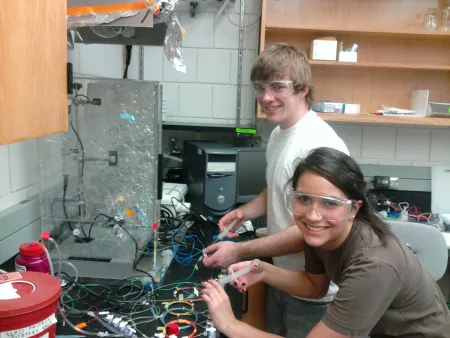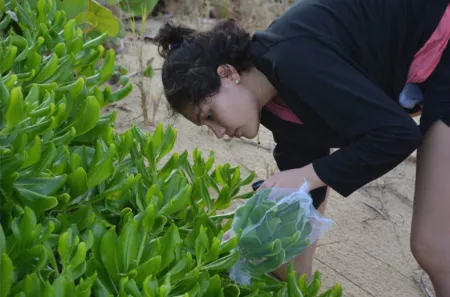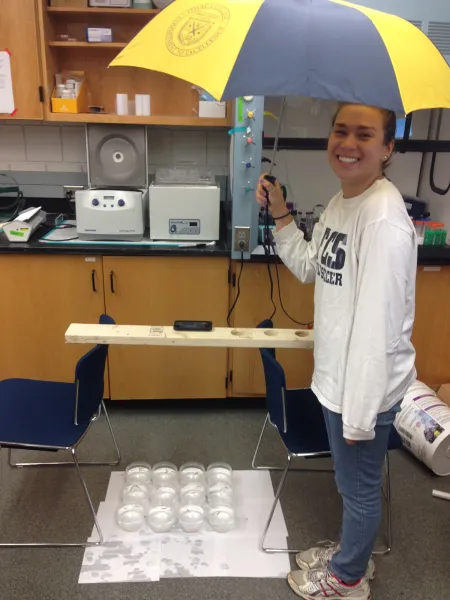In this 3-credit course as a Biology major you will take ownership of an original research project under the mentorship of a faculty member expert in the discipline. The answers to the questions we are asking are unknown at present, allowing you to engage in genuine research of discovery. Some students may end up co-authoring papers in scientific journals based on their research and others will go on to give posters or presentations at scientific meetings. We don't expect that from every project or student, but it is worth knowing that the possibility is there.
Students must co-register for the 1-credit Presenting Biology course.
Biochemistry majors have an analogous BIOC course requirement.
What is 302?

Policies on Non-Standard 302 Options

Academic Year Research at IC Outside the Department
A student interested in doing a project in conjunction with an IC faculty member outside of the Biology department would have to arrange a Biology department faculty sponsor. The student would enroll in BIOL-302 under that Biology faculty sponsor as usual, but the work itself might be directly supervised by the outside-department faculty member. The specific advising roles of the two faculty members should be established between them prior to the student beginning research, with the outside member and student briefed on the BIOL-302 syllabus and requirements. The Biology faculty member would retain the role of approving that the work being conducted was appropriate to and met BIOL-302 standards, and would be responsible for final grading for the course.
Off-Campus Research Experience
Students may complete the research requirement by conducting research off-campus provided that the student has Biology Curriculum Committee approval and that the research experience is comparable to an on-campus research experience. Off-campus experiences may include students conducting research as part of a foreign exchange program.
At least one month before the off-campus research is to begin, the student must:
- Obtain a signed letter from the off-campus sponsor
- Identify a willing Biology department faculty sponsor
- Submit an application proposing Biol-302 Research Credit for Work Done Elsewhere
- Receive approval of this proposed work
At completion of the off-campus experience, the student must then also complete:
- Have off-campus sponsor submit a Student Research Evaluation Form directly to the Biology faculty sponsor.
- Submit a research report to the faculty sponsor. Like all 302 final papers, it should be written as a scientific research article with introduction (including review of relevant literature), materials and methods, results, discussion, and references cited.
- Give a 12-minute presentation in the academic term after the work is complete.
- Make up three credits with another biology elective above the 200-level.
- Petition the Biology Curriculum Committee to waive the 302, providing
- a formal cover letter requesting the waiver of the 302
- a copy of the research report
- a copy of the letter from the off-campus supervisor describing your role in the research and an evaluation of your work (your faculty sponsor should forward this)
- a course waiver/substitution form submitted online (requires assistance of your faculty sponsor)
The Curriculum Committee reserves the right to deny acceptance of a waiver petition if it feels that the student has not demonstrated completion of an appropriate research experience, even if approval was given at the outset for the prospective project.
Summer Research at IC
A student may elect to take their 302 for credit in the summer enrolled in one of the two 5-week summer sessions. There is no guarantee of faculty sponsorship; summer research for credit must be arranged well ahead of time with the faculty sponsor. Students and faculty sponsors planning field research need to consider which summer session may be most appropriate for data gathering. Students will give their research presentations in the subsequent fall semester.
A student who conducts summer research in an internship or other paid position in the Biology Department may petition to the Curriculum Committee to waive the 302 requirement. Petition process is like the off-campus experience, but without requiring letters from the supervisor. The student must make up the three credits in another biology course. The student must provide a written report of research and give a presentation in the subsequent fall semester.
What Does This Course Entail?

Each faculty member runs their lab slightly differently, given the differing nature of research in each discipline. However, the common structure is that you will:
* Undertake a scientific project with some independence
* Spend nine hours per week in the lab, on average
* Meet regularly one-on-one with supervising faculty
* Participate in group research lab meetings (if such occur)
* Provide clear documentation of experiments, data, and analysis
* Give a 12-minute presentation in the Research Symposium at the end of term
* Write a final paper formatted as a scientific research article